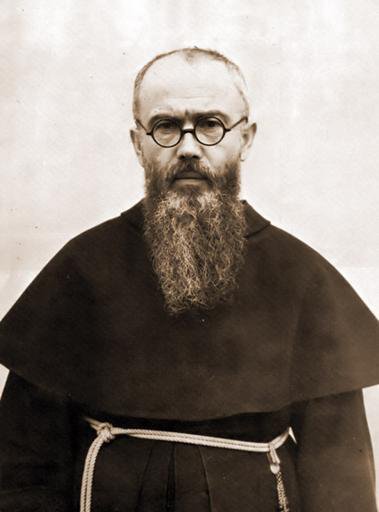Thoughts for the Day
Monday, 14th August 2023: Maximilian Kolbe, Friar, Saint, Martyr (1894-1941 CE)
Protection 1 Peter 4 Martyr Worrying God Saint
Reading : Verses from 1 Peter, Chapter 4

Beloved, do not be surprised at the fiery ordeal that is taking place among you to test you, as though something strange were happening to you. But rejoice in so far as you are sharing Christ’s sufferings, so that you may also be glad and shout for joy when his glory is revealed. If you are reviled for the name of Christ, you are blessed, because the spirit of glory, which is the Spirit of God, is resting on you. But let none of you suffer as a murderer, a thief, a criminal, or even as a mischief-maker. Yet if any of you suffers as a Christian, do not consider it a disgrace, but glorify God because you bear this name. For the time has come for judgement to begin with the household of God; if it begins with us, what will be the end for those who do not obey the gospel of God? And ‘If it is hard for the righteous to be saved, what will become of the ungodly and the sinners?’
Therefore, let those suffering in accordance with God’s will entrust themselves to a faithful Creator, while continuing to do good.
(Lectionary, New Revised Standard Version)
Thoughts
Maximilian Maria Kolbe, was born in 1894 in a part of the Russian Empire, that is now Poland. Aged 12 Kolbe had a vision of the Virgin Mary who offered him a white or a red crown (symbolising a life of purity or martyrdom), and he apparently chose both. The vision affected him deeply and a year later he and a brother joined the Franciscan order, to live out its ideals in the world. He later studied at Rome, and was ordained a priest in 1918 but suffering from tuberculosis returned to Poland, becoming a lecturer in church history. He published a magazine for Christians, and in 1927 founded a religious centre that attracted some 700 friars. He later founded sister institutions in Japan and India, and on his return in 1938 a Christian radio station. The centre was to shelter an estimated 2,000–3,000 Polish refugees, mostly Jewish, as well as continuing to publish anti-Nazi publications. In February 1941 he was arrested, on charges of aiding Jews and the Polish underground. He was imprisoned in Warsaw, then shipped to Auschwitz. There he continued his priestly ministry, hearing confessions and holding masses with smuggled bread, for which he was subjected to beatings by the guards. Following a prisoner’s escape, 10 men were randomly selected to die as a punishment. Kolbe volunteered his life in the place of Franciszek Gajowniczek, who was married with young children. Kolbe was starved for two weeks and finally injected with carbolic acid, before his body was cremated.
On 17th October 1971, Kolbe was beatified by Pope Paul VI, the first Nazi victim to be so blessed by the Roman Catholic Church, and in 1982 Pope John Paul II canonized him, proclaiming also that he was to be venerated as a martyr. Gajowniczek survived Auschwitz and attended both ceremonies.
Today our work for Christ and our suffering can seem minimal in comparison to Maximilians, but may we endure it with patience and a calm mind, knowing that the Lord is always with us.
Prayer
Heavenly Father,
You may not call us to martyrdom,
but this life can cause us grief.
Sometimes we struggle with ill health
or with the illness or death of a loved one.
At other times we experience suffering
or hardship.
May we approach such adversity
with courage and faith,
and be prepared to give up what we have
to help those who are in need.
Amen.
You might like to play this hymn to remind yourself that you always have God at your back:
- A mighty fortress is our God (Martin Luther)